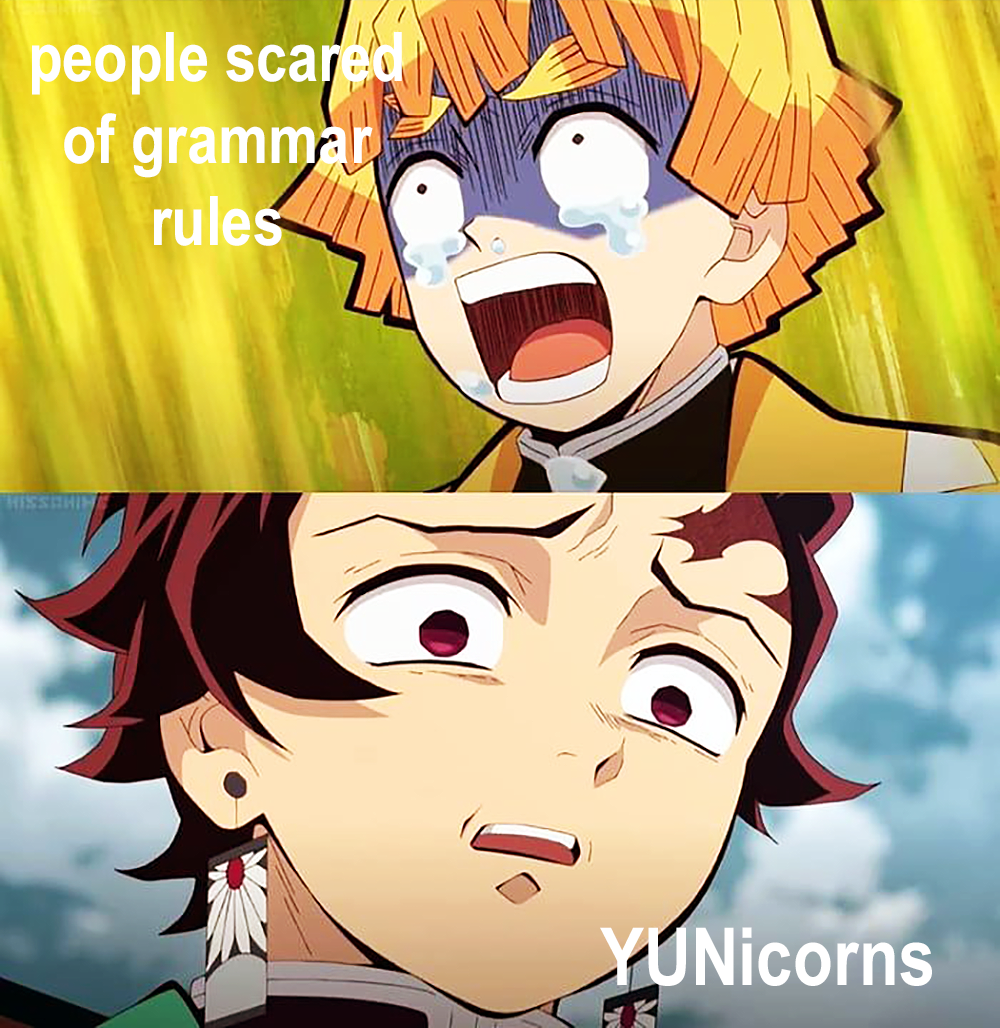SUBJECT-VERB AGREEMENT (PART 3)
NEITHER, EITHER
Whether “neither” requires a singular or plural verb depends on the second noun (the one after “nor”):
- Neither the boys nor Allison likes cookies. (Since “Allison” is singular, we use “likes.”)
- Neither Allison nor the boys like cookies. (Since “boys” is plural, we use “like.”)
- Neither Mike nor Janice reads comic books. (Since “Janice” is singular, we use “reads.”)
- I think that neither celebrities nor athletes make good role models. (Since “athletes” is plural, we use “make.”)
The same idea applies to “either”:
- Either Henry or Peter brings snacks to our weekly meetings. (Since “Henry” is singular, we use “brings.”)
- Either my friends or my mom drives me to school every morning. (Since “my mom” is singular, we use “drives.”)
- We don’t need an alarm clock: either Chewie or our neighbor’s dogs wake us up. (Since “dogs” is plural, we use “wake.”)
- Either Levi or Kaneki is Henry's latest anime obsession. (Since “Kaneki” is singular, we use “is.”)
PRONOUNS (THIS, THAT, THESE, THOSE)
“This” and “that” are singular.
“These” and “those” are plural.
- These are better than those.
- This is prettier than that.
- That is why we don’t eat worms anymore.
- Those are excellent books you’ve chosen to read.
HERE, THERE
Whether “here” and “there” should be followed by singular or plural verbs depends on what comes after “here” and “there”:
- Here is a book I used to love as a child. (“A book” is singular, so we use “is.”)
- There are six chairs I would like you to repair. (“Chairs” is plural, so we use “are.”)
- Here are some words you should learn. (“Words” is plural, so we use “are.”)
- There is no sign of despair on her face. (“Sign” is singular, so we use “is.”)
FRACTIONS, PERCENTS, ETC.
Just like the topics above, fractions, percents, and other similar terms are dependent on the words that follow them:
- Half of the students are going to fail the class. (“Students” is plural, so we use “are.”)
- Two-thirds of my birthday cake is rotten. (“Cake” is singular, so we use “is.”)
- Sixty percent of the senior class is going to graduate on time. (“Class” is singular, so we use “is.”)
- Some of the teachers are planning to go on strike. (“Teachers” is plural, so we use “are.”)
- A majority of the electorate is getting ready to vote. (“Electorate” is singular, so we use “is.”)
- Most of my friends watch too much television. (“Friends” is plural, so we use “watch.”)
- Forty percent of children prefer reading to playing. (“Children” is plural, so we use “prefer.”)
- Three-fifths of the workers were hired last year. (“Workers” is plural, so we use “were.”)
- Most of the water was polluted and undrinkable. (“Water” is singular, so we use “was.”)
AS WELL AS, ALONG WITH, ETC.
“As well as,” “along with,” and “together with” are not like “and.” We ignore the nouns that are attached to those phrases and focus instead on the earlier noun:
- Henry, as well as his cousins, is sick with the flu. (We ignore “as well as his cousins.”)
- Peter, along with his friends, has been to Arizona. (We ignore “along with his friends.”)
- Nan, together with me and Peter, cares about grammar and vocabulary. (We ignore “together with me and Peter.”)
- This article, along with the two earlier ones, concludes this subject. (We ignore “along with the two earlier ones.”)
Contrast this to “and”:
- Henry and his cousins are sick with the flu. 🤒🤧
- Peter and his friends have been to Arizona. 🌵🏜
- Nan, Peter, and I care about grammar and vocabulary.
- This article and the two earlier ones conclude this subject.
We hope this three-part series on subject-verb agreement was helpful.







